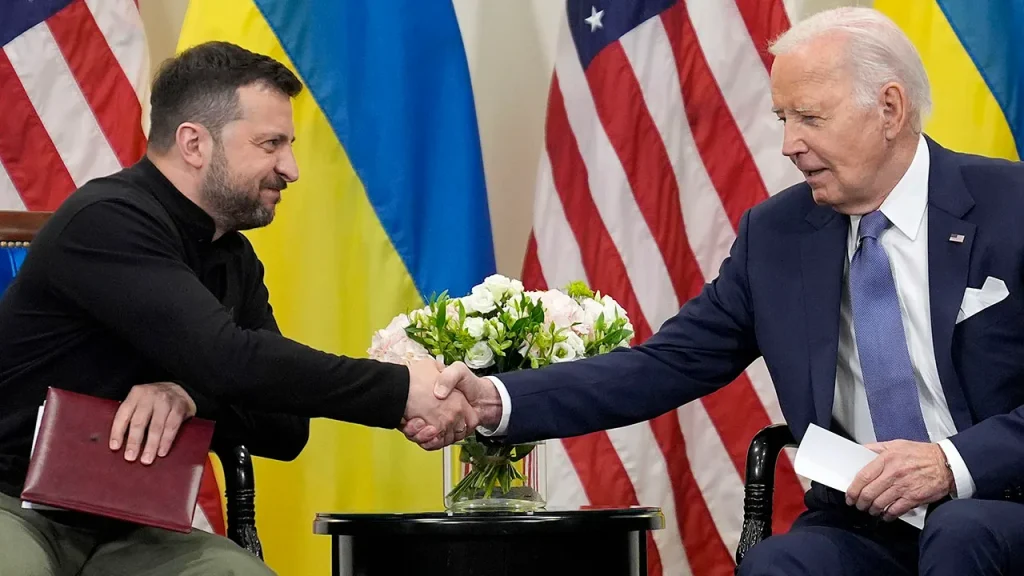President Biden met with Volodymyr Zelenskyy in Paris, following D-Day commemorations, to discuss Ukraine funding struggles. Biden apologized for delays in passing a foreign aid package due to opposition from conservative members of Congress. He assured Zelenskyy of continued support and announced an additional $225 million package for reconstructing Ukraine’s electric grid. The funding issues reflect growing skepticism among fiscal conservatives about U.S. financial involvement with Ukraine, despite warnings from national security hawks about the importance of Ukraine’s victory in preventing broader conflict between NATO and Russia.
The stalled foreign aid package, which finally passed Congress in late April, has brought to light concerns about corruption within Ukraine’s government. While some Republicans question the wisdom of continued financial support for Ukraine, others emphasize the strategic importance of preventing a Russian victory in Ukraine and thwarting Vladimir Putin’s ambitions for a second “axis of evil” with Iran and China. Biden’s remarks to Zelenskyy underscored the importance of unity and bipartisan support in ensuring that the United States stands by Ukraine, drawing parallels between the current situation and World War Two when American support was crucial in saving lives and Europe.
Zelenskyy thanked Biden for his ongoing support and called for continued unity between the United States and Ukraine. He stressed the historical significance of American assistance during World War Two and urged that the same spirit of cooperation be maintained in the current situation. The meeting between Biden and Zelenskyy highlighted the importance of international alliances and the need for continued aid to Ukraine in the face of growing threats from Russia and potential escalation of conflict. The announcement of additional funding for Ukraine’s reconstruction efforts indicates a commitment to supporting the country’s efforts to defend its sovereignty and rebuild following years of conflict.
The conversation between Biden and Zelenskyy also touched on the challenges of navigating political dynamics and securing bipartisan support for foreign aid packages in the face of opposition and skepticism. The issue of corruption within Ukraine’s government adds another layer of complexity to the debate over financial assistance and raises questions about the effectiveness and accountability of aid programs. Despite these challenges, the message from both leaders emphasized the importance of standing together and supporting Ukraine in its efforts to defend against external threats and preserve its independence. The ongoing debate within the Republican Party over how to approach funding for Ukraine reflects broader divisions within U.S. foreign policy and national security strategy.
Overall, the meeting between Biden and Zelenskyy highlighted the complexities of navigating international relationships and securing support for crucial funding initiatives. The discussion underscored the strategic importance of Ukraine’s victory in preventing wider conflict and countering Putin’s aggressive actions in the region. As the situation continues to evolve, the need for continued aid, unity, and cooperation between the United States and Ukraine remains crucial in the face of growing threats and challenges. Biden’s commitment to supporting Ukraine’s reconstruction efforts and providing additional funding signals a willingness to stand by Ukraine and uphold the values of democracy and sovereignty in the face of external aggression.


